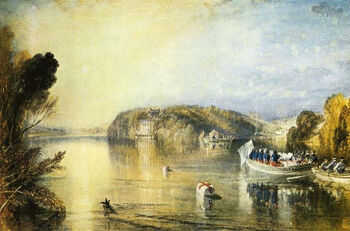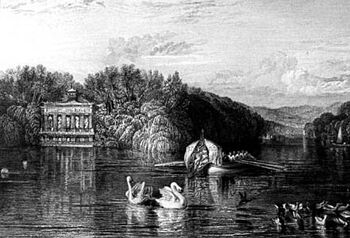
"Virginia Water" by J W M Turner

"Virginia Water" by J M W Turner
Synopsis[]
"The Mourner" is a story about a young man named Neville and a young lady named Ellen. In the beginning of the narration, Neville is walking with his fiance Juliet in Virginia Water. They come upon an unmarked grave the Neville is familiar with, that of his childhood friend Ellen. Neville then narrates their tale, assuring his soon to be bride that he was never in love with her. Neville ran away from boarding school, and after falling asleep under a tree meets Ellen who takes her to a little cottage that she lives in. They become friends, and Neville visits her every day and they become fast friends. Ellen is a melancholy child that contemplates suicide, who is just drowning in her misery without the companionship of Neville. When Neville leaves for holiday, Ellen tells him not to write to her, just to return. His leg is injured, however, and he spends his time healing at the home of Lewis Elmore. Elmore is desperate to find his fiance, Clarice, and while helping him search for her he discovers that the fiance is none other than his friend, Ellen. He and Elmore rush to her cottage, only to discover that she has died and apparently committed suicide. She left a note for Neville, instructing him that no stone should mark her body, and the she is finally at peace.
Themes of Isolation and Identity[]
This short story explores many themes, the most prevalent being that of isolation and identity. Isolation is seen in many characters, and in different forms. In the case of Horace Neville, he is outcast by his tyrannical father and once he arrives at boarding school he further secludes himself by entering into a friendship with Ellen, a sad and lonely girl who has completely isolated herself from society. Neville continues to visit her every day, and comes to depend on this girl for solace and comfort, saying "If you leave me, what will become of me?" (90). This statement come after Ellen reveals her thoughts of suicide, the ultimate act of isolation. It seems as if these two are caught in a downward sprial of complete isolation from the world around them. It seems that Shelley is showing that those around you can affect the emotions that you have and can influence you into isolation yourself, perhaps reflecting on the idea that sorrow and grief consume those around you, even if they are not a part of the initial devistation. Ellen is a character that is the personification of a lonely heart. She has a deep grief that overwhelms her at times, causing her physical pain that overcomes her and makes her wish to be completely alone (89). Here Shelley comments on the consuming qualities of grief, and how sometimes your grief is so great that you must be alone to battle it. Ellen's isolation from the world is complete, and this is seen in her reaction when Neville brings her a newspaper with an ad in search of survivors from a shipwreck. She shuns the news and delves deeper into herself to escape the outside world (90). With this Shelley comments on how grief makes you push away all signs of what caused you pain, since the shipwreck was the cause of all of Ellen's grief.
Once Neville is removed from Ellen while on holiday, he recovers a little more of his identity that wasn't consumed by being in the constant presence of Ellen. He is able to once again think rationally and enjoy his life, participating in a hunt when on holiday (91). However, after his injury he is confined to the home of Elmore. This leads him to dwell on Ellen, even to write to her, showing that he cannot fully seperate his identity from hers any longer. This is also evidenced in the fact that he visits her grave after she has been long dead, and he feels he must relate her narration to his fiance before he can marry her (85). This dependence is contrasted with Ellen's dependence on him, which is the opposite: Ellen doesn't depend on Neville for happiness, and his presence only postpones her inevitable suicide. She is completely isolated and no one can console her.
It is also important to examine the reason for Ellen's grief, and her identity before she meets Neville in the country. Ellen is in fact Clarice Eversheem, who is engaged to Elmore, the man Neville stays with while recouperating from his broken leg. While away with her father, Clarice and the people onboard the St. Mary wreck and the ship is consumed in flames. As the ship is going down, Clarice clings to her father and will not let him go without her to be saved, putting both their lives at risk. The captain calls to Clarice and tells her that she will be the death of her father, calling her "a parricide" (94). This haunts Clarice/Ellen til the day that she dies. Clarice watches as her father drowns and she realizes that she was in fact the cause of his death. The survivors whisper about her, making things worse, and she becomes a ghost in her own body, barely eating, barely speaking (94). Shelley uses this tale to show how immediate grief is, how overwhelming to the senses it can be. In a letter after Ellen's death, addressed to Neville, she tells him to inform Elmore about the loss of his beloved, stating "describe your poor Ellen to him, and he will speedily see that she died on the waves of the murderous Atlantic. Ellen had nothing in common with her, save love for, and interest in him." (98) It's as if Clarice had tied her identity to that of her father, much like Neville has tied himself to Ellen, and when Clarice's father perished, so did that particular identity. These dual identities show how Mary Shelley envisions grief and how it changes people. Grief, along with guilt in Clarice/Ellen's case, completely change who you are, transforming you into an emptier version of who you used to be. Here, isolation and identity go hand in hand. Ellen isolates herself to seperate herself from the guilt of her fathers death, and it is in that isolation that she is freed, through suicide, of the burden she bares. Conversly, it is in the isolation that Neville experiences that he further defines his identity through his friendship with Ellen, and once he is isolated from her through her death, he fully affirms his identity and mutates her into his own. That is why it is so important that Juliet, soon to become of one flesh with Neville, must know about the Ellen part of him, so that she can fully understand him as a human being.
Ties to Shelley's life[]
This short story is a reflection of the grief and guilt experienced by Shelley after her husband's death. Percy Shelley died while sailing on his schooner, Don Juan, in a horrible storm. After this, Mary Shelley obviously experienced immense grief, since Percy Shelley was her true love. [[[There is a dramatic shift in all of her literature after his death, and the death of her close friend, Lord Byron, and since then all of her narrations include charicatures of them. The reader can only guess at who is who in this short story, but it is certain that Clarice/Ellen is a personification of Shelley herself in the days following the death of her beloved husband.]]] It is also important to note that the name of the ship that sinks is the St. Mary (93).
Works Cited[]
Shelley, Mary. “The Mourner”. Collected Tales and Stories. ed. Charles E. Robinson. Baltimore MD: The Johns Hopkins University Press, 1976. 81-99. Print.
